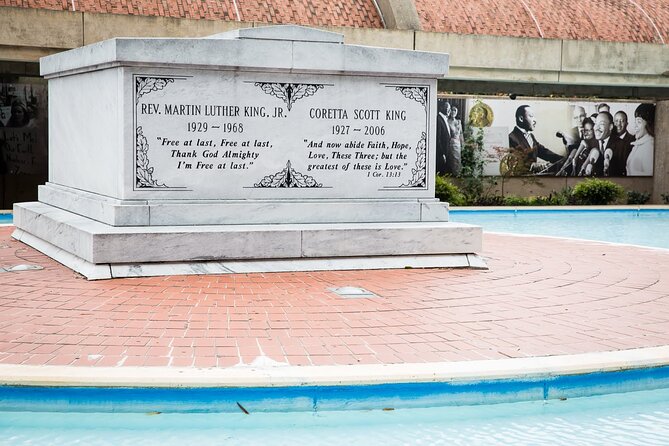Atlanta’s role in the critical events that shaped America’s history can’t be overstated. The city’s resilience after the Civil War‘s devastation fueled its rise as an industrial powerhouse. But Atlanta also became a crucible for the civil rights movement, where leaders like Martin Luther King Jr. fought to dismantle Jim Crow and pursue racial justice. Exploring this complex legacy offers insights into America’s ongoing struggle for equality.
Key Points

- Atlanta’s strategic location made it a vital target during the Civil War, leading to its capture and heavy damage, but also resilience and post-war rebuilding.
- The Confederacy’s defeat ended slavery but left a contentious legacy, with ongoing debates over the historical significance and appropriateness of its symbols.
- Atlanta was a crucial battleground for the Civil Rights Movement, with key events and leaders like Martin Luther King Jr. driving progress through nonviolent tactics.
- Desegregation in the 1960s marked a turning point, leading to greater equality and opportunity, but challenges in achieving true racial justice remain.
- Exploring historic sites in Atlanta, such as the Martin Luther King Jr. National Historic Site and the Center for Civil and Human Rights, provides insights into the city’s pivotal role in these crucial eras.
Atlanta’s Role in the Civil War

During the American Civil War, Atlanta played a pivotal role. As a major transportation hub and industrial center, the city was a strategic target for Union forces.
In 1864, Union General William Tecumseh Sherman launched his infamous "March to the Sea," capturing Atlanta after a lengthy siege. The city was heavily damaged, with much of its infrastructure destroyed.
However, Atlanta’s resilience shone through as it rebuilt and emerged as a center of commerce and industry in the post-war era.
Today, the city’s Civil War history is preserved in museums and historic sites, offering visitors a glimpse into this pivotal chapter of American history.
You can also read our reviews of more tours and experiences in Atlanta.
The Legacy of the Confederacy
Although the Confederacy’s defeat in the Civil War marked the end of slavery, its ideological legacy has had a lasting impact on the United States.
The symbols and monuments of the Confederacy have become highly contentious, with ongoing debates over their historical significance and appropriateness in public spaces.
While some view them as reminders of Southern heritage, others see them as offensive glorifications of white supremacy.
The legacy of the Confederacy continues to shape contemporary discussions on race, historical memory, and the unfinished work of achieving racial justice in America.
The Civil Rights Movement in Atlanta
Atlanta stood as a crucial battleground in the Civil Rights Movement, which sought to dismantle the entrenched systems of racial segregation and discrimination that had persisted since the Confederacy’s defeat.
The city witnessed pivotal events, including the 1956 Montgomery bus boycott, the 1963 March on Washington, and the 1965 Voting Rights Act.
Civil rights leaders like Martin Luther King Jr., John Lewis, and Andrew Young led the charge, organizing sit-ins, marches, and demonstrations that galvanized the nation.
Though facing violent resistance, the movement’s nonviolent tactics ultimately led to the dismantling of Jim Crow laws and the advancement of racial equality.
Exploring Historic Sites
What historic sites do visitors explore on this tour?
The tour takes guests to key sites from the Civil War era through the Civil Rights Movement. Visitors see the Martin Luther King Jr. National Historic Site, which includes his birthplace, Ebenezer Baptist Church, and the King Center.
They also visit the Center for Civil and Human Rights, an interactive museum that chronicles the struggles and triumphs of the Civil Rights Movement.
Along the way, the guide provides historical context and insights into Atlanta’s role in these pivotal moments in American history.
Understanding Racial Tensions
While the Civil War and Civil Rights Movement marked pivotal moments in the ongoing struggle for racial equality, the tensions and legacies of these historic events continue to shape the social fabric of Atlanta today.
Racial divides, systemic inequalities, and the persistent echoes of past violence have created a complex and often contentious landscape. Navigating this terrain requires a nuanced understanding of the city’s history and an acknowledgment of the persistent challenges faced by communities of color.
As visitors explore Atlanta’s landmarks, they confront the difficult realities of the past and the ongoing efforts to build a more just and equitable future.
The Impact of Desegregation
The desegregation of Atlanta’s public schools in the 1960s marked a significant turning point in the city’s civil rights movement. After years of legal battles, the courts ordered the integration of schools, which led to protests and violence.
However, the process ultimately paved the way for greater equality and opportunity. Students of all races began learning together, fostering understanding and dismantling segregation.
This catalyzed further progress, as public facilities, neighborhoods, and workplaces gradually desegregated. While challenges remained, desegregation signified a shift towards a more just and inclusive society, setting the stage for the continued fight for civil rights.
The Ongoing Struggle for Equality
Even as desegregation paved the way for greater equality, the struggle for civil rights continued in Atlanta and across the nation.
While landmark legislation like the Civil Rights Act of 1964 and the Voting Rights Act of 1965 outlawed discrimination, barriers to true equality remained.
The fight for justice encompassed:
- Addressing systemic racism in employment, housing, and education.
- Securing voting rights and political representation for marginalized communities.
- Advocating for economic opportunities and social mobility.
- Combating police brutality and promoting police accountability.
The journey towards equity and justice remained arduous, but the determined spirit of the civil rights movement persisted.
Recap
Atlanta’s journey from the devastation of the Civil War to the triumphs of the Civil Rights movement exemplifies the city’s resilience and its pivotal role in shaping America’s history. Though challenges remain, Atlanta’s legacy as a battleground for equality continues to inspire progress and serve as a reminder of the ongoing struggle for justice.
More Tour Reviews in Atlanta
- Arrival Private Transfer Hartsfield Airport ATL to Atlanta by Car
- Private Car Transfer From Atlanta Airport to Atlanta Metro Area
- Atlanta Round Trip Chauffeur Driven Transport by Executive Sedan
- Roundtrip Transfer in Executive Private Car From Atlanta Airport to Alpharetta
- One Hour Adventures in The Escape Game Atlanta: The Interlock
- Atlanta Comedy City Tour
Not for you? Here's more things to do in Atlanta we have recnetly reviewed
- 2 Best Dining Experiences In Atlanta
- 2 Best Dinner Tours In Atlanta
- 2 Best Jet-Ski Experiences In Atlanta
- 6 Best Photography Experiences In Atlanta
- 20 Best Private Car With Driver Services In Atlanta
- 11 Best Food Tours In Atlanta
- Atlanta: Tabernacle Transportation
- Fresh Fettuccine From Scratch With Classpop in Atlanta
- Atlanta: Martin Luther King Quest Experience
- Atlanta Airport (ATL) to Lithia Springs RoundTrip PrivateTransfer
- Peach Museum Ticket Experience
- African-American Heritage and Civil Rights Atlanta Half-Day Tour
